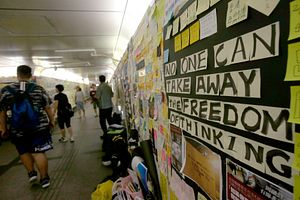Taiwan’s weekend solidarity protests supporting Hong Kong’s ongoing pro-democracy movement, which brought tens of thousands to the streets in five Taiwanese cities, also saw Hong Kong activist Denise Ho attacked with red paint, allegedly by members of the fringe Chinese Unification Promotion Party (CUPP).
Both the ruling Democratic Progressive Party (DPP) and opposition Kuomintang (KMT) condemned the attack, which came days after several incidents involving Chinese nationals vandalizing “Lennon Walls” at Taiwanese universities and allegedly assaulting Hong Kong and Taiwan students.
Taiwan officials condemned Beijing’s “one country, two systems” framework in a press conference on October 1, China’s National Day. On Wednesday, a National Immigration Agency (NIA) official said Chinese nationals who damage Lennon Walls face deportation and will not be allowed to return to Taiwan.
Police identified the culprit behind the paint attack on Denise Ho as CUPP chairman Hu Chih-weh. The CUPP, which is chaired by the notorious former gang leader Chang An-le, or the “White Wolf,” is a fringe party with links to funding from China which was searched by Taiwanese investigators in August.
Ho has vowed to sue Hu and his alleged accomplice, Liang Tai-fu, for intimidation and public humiliation, according to local news reports.
The pro-unification CUPP and its members regularly participate in audacious public stunts, such as when Chang displayed a casket during a February protest meant to represent the deaths of Taiwanese soldiers defending a Chinese invasion. As the prop was unloaded, Chang stumbled and fell into the casket.
At Sunday’s Taipei protest, 2014 Sunflower Movement leader and current DPP deputy secretary-general Lin Fei-fan denounced the attack and stressed that demonstrators must “respect different opinions, but not use violence.”
The opposition KMT said in a statement that the “violent acts” committed on Sunday “run against the spirit of democracy and are the common enemy of democracy.”
President Tsai Ing-wen and the ruling DPP have been vocal in their support of Hong Kong protests and have steadfastly condemned the use of violence by Hong Kong police forces. The KMT has stated its opposition to “one country, two systems” but has been more measured in discussing the Hong Kong protests. Its presidential candidate, Kaohsiung mayor Han Kuo-yu, has accused Tsai of using the protests for political purposes.
Hong Kong’s protests, along with the overall maintenance of Taiwan’s democracy, retain broad support among Taiwanese voters and pro-Beijing outfits such as the CUPP operate on the fringes of Taiwan’s political environment.
But the DPP and KMT regularly spar over cross-strait matters, with the KMT advocating warmer relations with Beijing and staunchly opposing Taiwan independence.
The Hong Kong protests have shone a spotlight on some Chinese nationals in Taiwan, including students in Taiwanese universities, who have allegedly been involved in defacing Lennon Walls and attacking supporters of Hong Kong’s pro-democracy movement.
Last week, a Chinese family was investigated for vandalization of a wall at Kaohsiung’s National Sun Yat-sen University. Police said the family had been seen tearing messages in support of Hong Kong’s protests from the wall.
In recent weeks, there have been several reports of Chinese university students in Kaohsiung and Taipei vandalizing Lennon Walls. In one case, a Chinese student at Kaohsiung’s I-Shou University allegedly tried to strangle a Hong Kong student who had posted messages of support on the school’s Lennon Wall.
Tsai Ing-wen condemned the incidents in a Facebook post, saying Taiwan “would never allow such actions or tolerate them.”
On Tuesday, China’s National Day, Taiwan’s Mainland Affairs Council said Taiwan would reject “one country, two systems” and denounced Beijing as a threat to regional peace, accusing it of seeking “an excuse for military expansionism.”
“The Chinese Communist Party has persisted with its one-party dictatorship for 70 years, a concept of governance that violates the values of democracy, freedom and human rights, causing risks and challenges for the development of mainland China,” the council said.

































